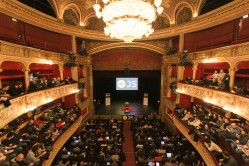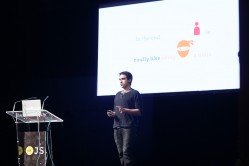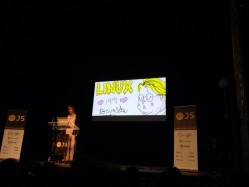
The format and the quality of the talks was very reminiscent of TED. Actually, Sylvain Zimmer, the master of ceremony, is also a co-organizer of TEDxParis. The line-up was pretty impressive, too. Let me skim over the tech talks before saying more on the two Open Source talks that will be of interest to non-geek types as well:
- Kevin Schaaf showed off his Enyo framework and how it could prove Zuckerberg wrong;
- Addy Osmani, Developer Programs Engineer at Google and member of the jQuery team, proved that the Chrome DevTools + Tincr made it the best browser for web devs;
- Bert Belder, of the Node.js core team, explained why they still had a long way to go before releasing 1.0;
- Jeremy Ashkenas, creator of Backbone.js and Underscore.js, talked about symbiotic languages and the CoffeeScript language which he created;
- Brian Leroux, PhoneGap lead, had a comedy/educational talk on the oddities of JavaScript, aptly named wtfjs;
- Christian Amor Kvalheim, creator of the MongoDB driver for Node.js, talked game development
- Mr.doob, creator of Three.js, gave an overview of the history of 3D demos and introduced us to frame.js, his upcoming graphical editor of 3D scenes and animations, entirely based on Html5 and WebGL
- Matthias Bynens, creator of jsperf.com and contributor to Html5 boilerplate, talked about Unicode and why the “pile of poo” is counted as two characters by JavaScript — and its the source of many bugs including one that’s almost made me lose the rest of this article…
“How to Open Source like a boss“
— Charlie Robbins (CEO at Nodejitsu)
“When you do things right, people won’t be sure you’ve done anything at all.” God Entity (Futurama)
Being a leader is more like being a detective, a referee (set some rules but let people do their thing). It requires strength of mind and character. The role of a leader also encompasses some teaching, and a lot of emails to reply to!
Finally, the specificity of Open Source communities is that they are organised in distributed systems: there is no hierarchy, but the way people are connected is more like a graph. At GitHub, for instance, it is said that there are no managers, or as Ryan Tomayko puts it, “everyone at GitHub is a manager.”
Charlie also mentioned that previously he’d worked in the finance industry, and he noticed that Bloomberg had recently started open-sourcing some of its code.
“What the fuck is Open Source and why do I feel so guilty?”
— fat (co-author of Twitter Bootstrap)
https://twitter.com/loris/status/274555620064129024
Fat’s perspective on GitHub was particularly interesting. Basically, he said that Open Source projects grew much quicker than in the past. In his own words, a “puppy” side-project could quickly turn into a monster dog, and you’d be spending much more time than you’d planned initially closing issues and answering pull requests. In the GitHub world, time to burnout accelerates, and OS project creators start looking desperately for exists. Some lose interest, which unfortunately results in a drop in quality of their projects.
So, how was the conference?
As you saw, there was an alternance of fun, technical, informational, business-like, and almost philosophical talks. I found that the speakers were brilliant and approachable. Very few laptops were open during the talks, which testifies of the quality of the talks. The conference was, indeed, very much unlike other conferences. The topics of the talks were a total surprise, since they hadn’t been announced prior to the conference. Unfortunately, this wasn’t to the taste of everyone and some called it a disappointment.
https://twitter.com/fvanlankvelt/status/274778728775704576
Overall, I really enjoyed the conference and learnt a lot, also at the workshops (I’d call them tutorials) on the saturday. I went to the WebGL one and got a chance to learn from the best (Mr.doob and Martin Görner).
There were a few glitches along the way, though: massive queue for registration outside the theatre (the temperature was close to 0°C in the morning), microphones weren’t working properly during the first talk, questions were to be asked through Google moderator but it was impossible to connect to the wifi. The DotJS team was quick to improve / fix things and continuously asked for / listened to feedback. But I have to say, even though the venue was impressive, the cramped corridors made logistics impractical. There were two lunch serves and some people complained about how long the lines to get food eventually became (but the food was really good, especially the ravioles de Romans!).
Look out for the next DotConferences
In his closing address, Sylvain announced a series of similar tech conferences in 2013, the DotConferences. He’s had quite a lot of success organising global events in English with his Joshfire mates Thomas Bassetto and Steren Giannini, such as Paris Hackers and HackDay Paris. Let’s wish them even more success for future events!
Did you like it? 4.6/5 (29)








